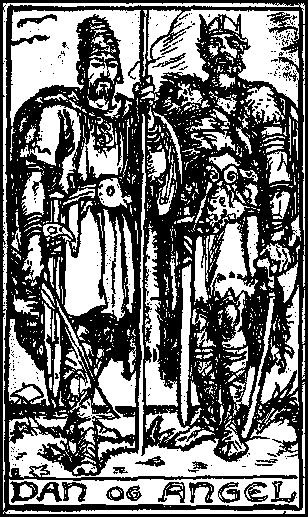Dan I was the progenitor of the Danish royal house according to Saxo Grammaticus's Gesta Danorum. He supposedly held the lordship of Denmark along with his brother Angul, the father of the Angles in Angeln, which later formed the Anglo-Saxons in England.
| Dan I of Denmark | |
|---|---|
 | |
| King of the Danes | |
| Successor | Humblus |
| Consort | Grytha |
| Issue | Humble Lother |
| House | Scylding |
| Father | Humble |
| Religion | Pagan |
Text
edit| Gesta Danorum, 1.1[1] | The Danish History, Book One[2] |
|---|---|
| Dan igitur et Angul, a quibus Danorum coepit origo, patre Humblo procreati non solum conditores gentis nostrae, verum etiam rectores fuere. Quamquam Dudo, rerum Aquitanicarum scriptor, Danos a Danais ortos nuncupatosque recenseat. Hi licet faventibus patriae votis regni dominio potirentur rerumque summam ob egregia fortitudinis merita assentientibus civium suffragiis obtinerent, regii tamen nominis expertes degebant, cuius usum nulla tunc temporis apud nostros consuetudinum frequentabat auctoritas.
Ex quibus Angul, a quo gentis Anglicae principia manasse memoriae proditum est, nomen suum provinciae, cui praeerat, aptandum curavit, levi monumenti genere perennem sui notitiam traditurus. Cuius successores postmodum Britannia potiti priscum insulae nomen novo patriae suae vocabulo permutarunt. Magni id factum a veteribus aestimatum. Testis est Beda, non minima pars divini stili, qui in Anglia ortus sanctissimis suorum voluminum thesauris res patrias sociare curae habuit, aeque ad religionem pertinere iudicans patriae facta litteris illustrare et res divinas conscribere. Verum a Dan (ut fert antiquitas) regum nostrorum stemmata, ceu quodam derivata principio, splendido successionis ordine profluxerunt. Huic filii Humblus et Lotherus fuere, ex Grytha summae inter Theutones dignitatis matrona suscepti. |
Now Dan and Angul, with whom the stock of the Danes begins, were begotten of Humble, their father, and were the governors and not only the founders of our race. (Yet Dudo, the historian of Normandy, considers that the Danes are sprung and named from the Danai. And these two men, though by the wish and favour of their country they gained the lordship of the realm, and, owing to the wondrous deserts of their bravery, got the supreme power by the consenting voice of their countrymen, yet lived without the name of king: the usage whereof was not then commonly resorted to by any authority among our people.
Of these two, Angul, the fountain, so runs the tradition, of the beginnings of the Anglian race, caused his name to be applied to the district which he ruled. This was an easy kind of memorial wherewith to immortalise his fame: for his successors a little later, when they gained possession of Britain, changed the original name of the island for a fresh title, that of their own land. This action was much thought of by the ancients: witness Bede, no mean figure among the writers of the Church, who was a native of England, and made it his care to embody the doings of his country in the most hallowed treasury of his pages; deeming it equally a religious duty to glorify in writing the deeds of his land, and to chronicle the history of the Church. From Dan, however, so saith antiquity; the pedigrees of our kings have flowed in glorious series, like channels from some parent spring. Grytha, a matron most highly revered among the Teutons, bore him two sons, HUMBLE and LOTHER. |
| The family tree of legendary Kings of the Danes, according to the Gesta Danorum (Books I to VII) | |||||||||||||||||||||||||||||||||||||||||||||||||||||||||||||||||||||||||||||||||||||||||||||||||||||||||||||||||||||||||||||||||||||||||||||||||||||||||||||||||||||||||||||||||||||||||||||||||||||||||||||||||||||||||||||||||||||||||||||||||||||||||||||||||||||||||||||||||||||||||||||||||||||||||||||||||||||||||||||||||||||||||||||||||||||||||||||||||||||||||||||||||||||||||||||||||||||||||||||||||||||||||||||||||||||||||||||||||||||||||||||||||||||||||||||||||||||||||||||||||||||||||||||||||||||||||||||||||||||||||||||||||||||||||||||||||||||||||||||||||||||||||||||||||||||||||||||||||||||||||||||||||||||||||||||||||||||||||||||||||||||||||||||||||||||||||||||||||||||||||||||||||||||||||||||||||||||||||||||||||||||||||||||||||||||||||||||||||||||||||||||||||||||||||||||||||||||||||||||||||||||||||||||||||||||||||||||||||||||||||||||||||||||||||||||||||||||||||||||||||||||||||||||||||||||||||||||||||||||||||||||||||||||||||||||||||||||||||||||||||||||||||||||||||||||||||||||||||||||||
|---|---|---|---|---|---|---|---|---|---|---|---|---|---|---|---|---|---|---|---|---|---|---|---|---|---|---|---|---|---|---|---|---|---|---|---|---|---|---|---|---|---|---|---|---|---|---|---|---|---|---|---|---|---|---|---|---|---|---|---|---|---|---|---|---|---|---|---|---|---|---|---|---|---|---|---|---|---|---|---|---|---|---|---|---|---|---|---|---|---|---|---|---|---|---|---|---|---|---|---|---|---|---|---|---|---|---|---|---|---|---|---|---|---|---|---|---|---|---|---|---|---|---|---|---|---|---|---|---|---|---|---|---|---|---|---|---|---|---|---|---|---|---|---|---|---|---|---|---|---|---|---|---|---|---|---|---|---|---|---|---|---|---|---|---|---|---|---|---|---|---|---|---|---|---|---|---|---|---|---|---|---|---|---|---|---|---|---|---|---|---|---|---|---|---|---|---|---|---|---|---|---|---|---|---|---|---|---|---|---|---|---|---|---|---|---|---|---|---|---|---|---|---|---|---|---|---|---|---|---|---|---|---|---|---|---|---|---|---|---|---|---|---|---|---|---|---|---|---|---|---|---|---|---|---|---|---|---|---|---|---|---|---|---|---|---|---|---|---|---|---|---|---|---|---|---|---|---|---|---|---|---|---|---|---|---|---|---|---|---|---|---|---|---|---|---|---|---|---|---|---|---|---|---|---|---|---|---|---|---|---|---|---|---|---|---|---|---|---|---|---|---|---|---|---|---|---|---|---|---|---|---|---|---|---|---|---|---|---|---|---|---|---|---|---|---|---|---|---|---|---|---|---|---|---|---|---|---|---|---|---|---|---|---|---|---|---|---|---|---|---|---|---|---|---|---|---|---|---|---|---|---|---|---|---|---|---|---|---|---|---|---|---|---|---|---|---|---|---|---|---|---|---|---|---|---|---|---|---|---|---|---|---|---|---|---|---|---|---|---|---|---|---|---|---|---|---|---|---|---|---|---|---|---|---|---|---|---|---|---|---|---|---|---|---|---|---|---|---|---|---|---|---|---|---|---|---|---|---|---|---|---|---|---|---|---|---|---|---|---|---|---|---|---|---|---|---|---|---|---|---|---|---|---|---|---|---|---|---|---|---|---|---|---|---|---|---|---|---|---|---|---|---|---|---|---|---|---|---|---|---|---|---|---|---|---|---|---|---|---|---|---|---|---|---|---|---|---|---|---|---|---|---|---|---|---|---|---|---|---|---|---|---|---|---|---|---|---|---|---|---|---|---|---|---|---|---|---|---|---|---|---|---|---|---|---|---|---|---|---|---|---|---|---|---|---|---|---|---|---|---|---|---|---|---|---|---|---|---|---|---|---|---|---|---|---|---|---|---|---|---|---|---|---|---|---|---|---|---|---|---|---|---|---|---|---|---|---|---|---|---|---|---|---|---|---|---|---|---|---|---|---|---|---|---|---|---|---|---|---|---|---|---|---|---|---|---|---|---|---|---|---|---|---|---|---|---|---|---|---|---|---|---|---|---|---|---|---|---|---|---|---|---|---|---|---|---|---|---|---|---|---|---|---|---|---|---|---|---|---|---|---|---|---|---|---|---|---|---|---|---|---|---|---|---|---|---|---|---|---|---|---|---|---|---|---|---|---|---|---|---|---|---|---|---|---|---|---|---|---|---|---|---|---|---|---|---|---|---|---|---|---|---|---|---|---|---|---|---|---|---|---|---|---|---|---|---|---|---|---|---|---|---|---|---|---|---|---|---|---|---|---|---|---|---|---|---|---|---|---|---|---|---|---|---|---|---|---|---|---|---|---|---|---|---|---|---|---|---|---|---|---|---|---|---|---|---|---|---|---|---|---|---|---|---|---|---|---|---|---|---|---|---|---|---|---|---|---|---|---|---|---|---|---|---|---|---|---|---|---|---|---|---|---|---|---|---|---|---|---|---|---|---|---|---|---|---|---|---|---|---|---|---|---|---|---|---|---|---|---|---|---|---|---|---|---|---|---|---|---|---|---|---|---|---|---|---|---|---|---|---|---|---|---|---|---|---|---|---|---|---|---|---|---|---|---|---|---|---|---|---|---|---|---|---|---|---|---|---|---|---|---|---|---|---|---|---|---|---|---|---|---|---|---|---|---|---|---|---|---|---|---|---|---|---|---|---|---|---|---|---|---|---|---|---|---|---|---|---|---|---|---|---|---|---|---|---|---|---|---|---|---|---|---|---|---|---|---|---|---|---|---|---|---|---|---|---|---|---|---|---|---|---|---|---|---|---|---|---|---|
|
Kings of the Danes are in bold and marked with an asterisk (*). Kings of the Swedes are marked with a dagger (†).
Name spellings are derived from Oliver Elton's 1905 translation, The First Nine Books of the Danish History of Saxo Grammaticus, via Wikisource. | |||||||||||||||||||||||||||||||||||||||||||||||||||||||||||||||||||||||||||||||||||||||||||||||||||||||||||||||||||||||||||||||||||||||||||||||||||||||||||||||||||||||||||||||||||||||||||||||||||||||||||||||||||||||||||||||||||||||||||||||||||||||||||||||||||||||||||||||||||||||||||||||||||||||||||||||||||||||||||||||||||||||||||||||||||||||||||||||||||||||||||||||||||||||||||||||||||||||||||||||||||||||||||||||||||||||||||||||||||||||||||||||||||||||||||||||||||||||||||||||||||||||||||||||||||||||||||||||||||||||||||||||||||||||||||||||||||||||||||||||||||||||||||||||||||||||||||||||||||||||||||||||||||||||||||||||||||||||||||||||||||||||||||||||||||||||||||||||||||||||||||||||||||||||||||||||||||||||||||||||||||||||||||||||||||||||||||||||||||||||||||||||||||||||||||||||||||||||||||||||||||||||||||||||||||||||||||||||||||||||||||||||||||||||||||||||||||||||||||||||||||||||||||||||||||||||||||||||||||||||||||||||||||||||||||||||||||||||||||||||||||||||||||||||||||||||||||||||||||||||
See also
editNotes
editReferences
edit- Davidson, Hilda Ellis (ed.) and Peter Fisher (tr.) (1999). Saxo Grammaticus : The History of the Danes : Books I-IX. Bury St Edmunds: St Edmundsbury Press. ISBN 978-0-85991-502-1. First published 1979–1980.
- Elton, Oliver (tr.) (1905). The Nine Books of the Danish History of Saxo Grammaticus. New York: Norroena Society. Available online
- Olrik, J. and H. Ræder (1931). Saxo Grammaticus : Gesta Danorum. Available online